What are Anisongs, and how has Anime music exploded worldwide?
Anime songs, also known as Anisongs, are finding new life outside of the shows and films they were created for, especially thanks to TikTok.
by Michelle Hyun Kim from Chartmetric
“Idol,” the hypercharged single by J-pop duo YOASOBI, was originally commissioned as the opening theme for the anime series Oshi no Ko, but it’s become a hit sensation all its own. Since its release on April 12, the track has topped the Billboard Japan Hot 100 chart for nine weeks straight, breaking the record for consecutive No. 1s in the country. On May 5, it received an English language version, leading it to crack the top 10 of the Billboard Global 200 chart.
As the lyrics relay the themes and storyline of the Oshi no Ko, which follows the supernatural happenings that swirl around a Japanese pop star named Ai Hoshino, “Idol” is a perfect storm of dramatic electronics, girlish spunk, and celebrity commentary. It instantaneously went viral in Japan, becoming the fastest J-pop song to exceed 100M YouTube views within a month and 297.4K TikTok videos, partly thanks to the cutesy choreography that Hoshino performs in the anime. The craze has no signs of slowing either, racking up 192M+ YouTube views and 98M Spotify streams.
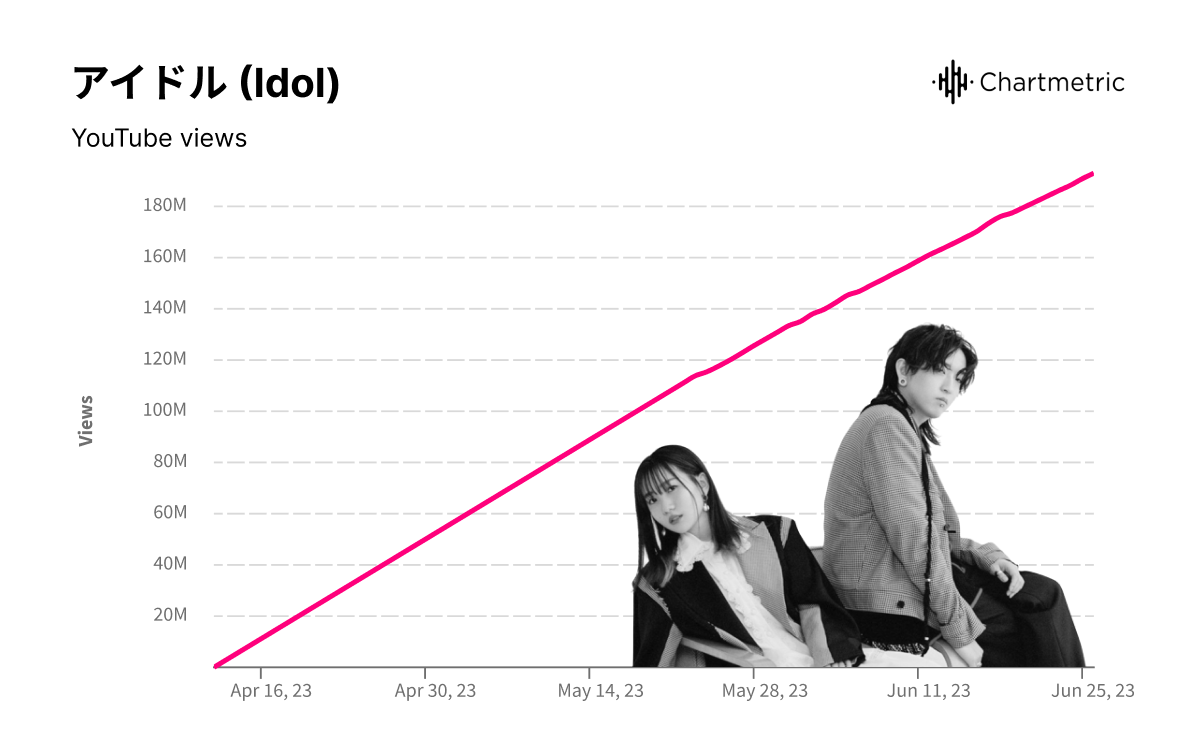
While it’s not the first anime track—a.k.a. anisongs—that has reached an audience outside of anime viewers, “Idol” suggests that “anime music” is reaching new global heights. As anime culture’s global spread has accelerated during the pandemic, multiple anisongs have become worldwide hits. Last year, Kenshi Yonezu’s “Kick Back” theme for the series Chainsaw Man peaked at No. 13 on Billboard Global 200 chart, while LiSA’s “Homura” theme for Demon Slayer the Movie: Mugen Train peaked at No. 8 in 2020. Like “Idol,” these songs were also quickly adopted by TikTokers making content related to cosplay, art, cooking, and other aspects of Japanese culture.
These modern-day anisong composers can also be found littered across popular Spotify playlists like “Anime Now” (753.9K followers), “Anime Hits” (572K followers), “Anime on Replay” (454K followers), all of which have grown steadily in the past few years. Though anisongs span lots of different sounds and styles, people are listening to this music outside the context of watching cartoons. But how did anisongs start taking a life outside of anime, what is appealing about the music itself, and are there any sonic identifiers that bind these tracks together?
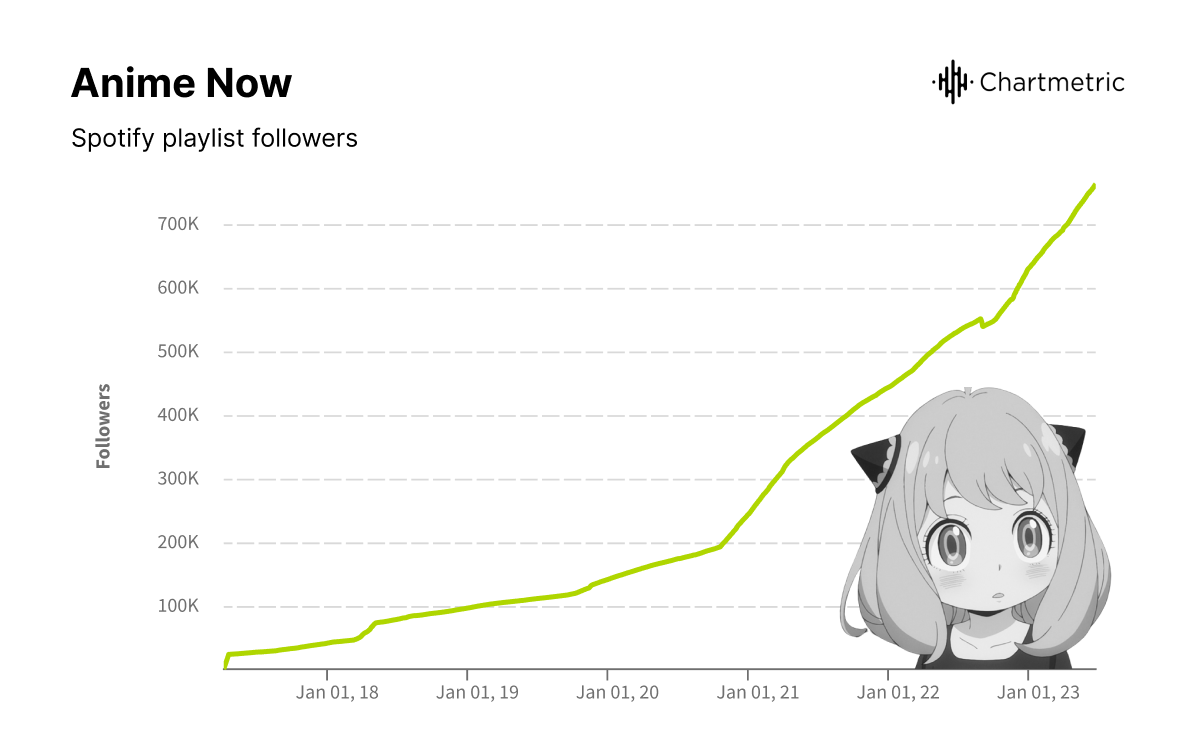
The Origins of Anisongs
Anisongs are any music created for the opening or ending sequence of an anime series, says Laurence Green, a scholar who writes about anime and popular Japanese culture. Functionally, they’re supposed to pique interest and prime the viewer, with the songs often reflecting the show’s themes or emotions of the main characters. Many avid anime watchers refuse to skip the opening theme because it’s tied into the experience of watching the show. These anisongs spark nostalgia and fondness within listeners who associate the music with the feelings of watching cartoons in the past.
As the first anime emerged in the 1960s, they were often accompanied by orchestral classical music with a jolly feel. Such was the theme of Astro Boy, the influential 1963 anime that set the tone for the rest of Japan’s anime industry. The show’s creator, Osamu Tezuka, was heavily influenced by the work of Walt Disney, bringing some elements from those classic cartoons into his animation style—which also explains the adoption of Western classical music for the first anisongs.
Anisongs Become “Pop” in Japan
As the anime industry expanded in the ‘80s, established musicians (as opposed to in-house producers and songwriters) began getting commissioned to make anime themes, leading to the first anisong hits. A seminal city pop artist, Anri was one of the first Japanese stars tapped to make an anisong, which became a big hit; her 1983 upbeat disco song “Cat’s Eye,” written for the anime of the same name, charted at No. 1 on Japan’s Oricon chart for five weeks straight and has continued to garner listeners throughout the decades. Over the past year, “Cat’s Eye” has been added to 398 Spotify playlists, leading its total playlist reach to climb from 461K to 640K listeners—an overall 39% increase.
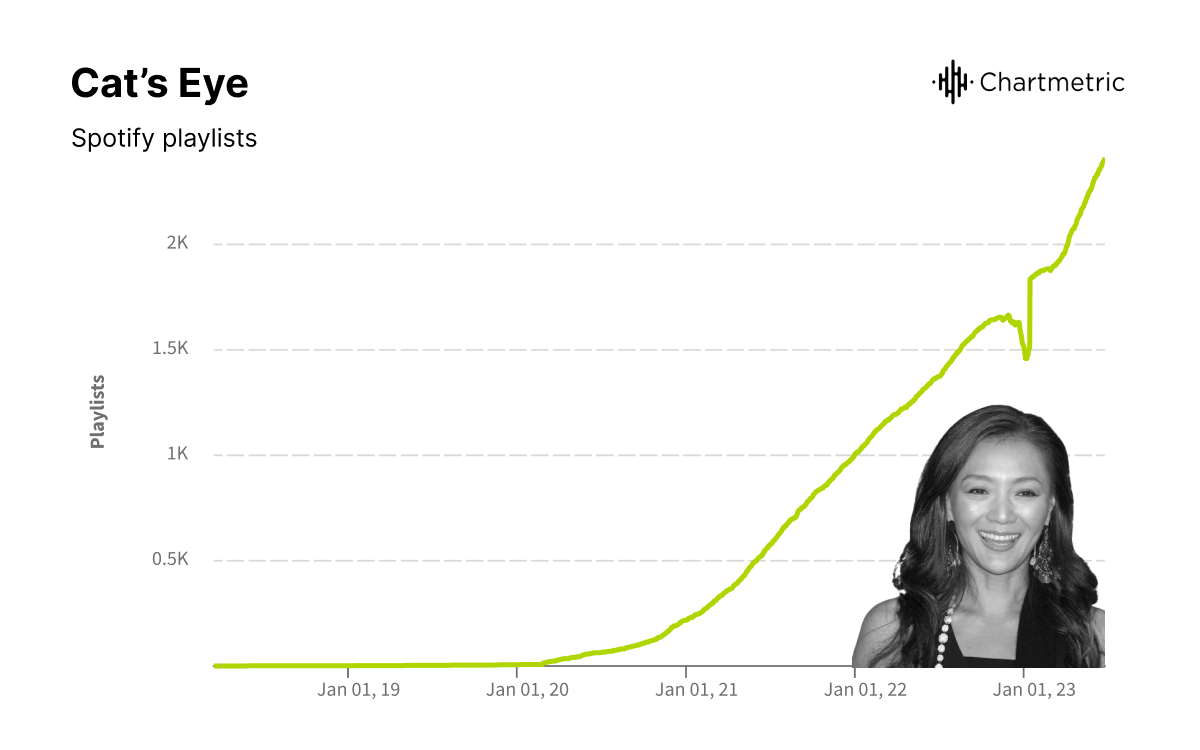
Meanwhile, heavy metal and rock artists also began contributing themes that would define the sound of anisongs to come—particularly the energetic electric guitar-led songs most associated with anime of the shōnen genre, which are stories geared toward young boys that are based around action, adventure, and fighting foes.
Perhaps the genre’s most indispensable series, Dragon Ball Z, also boasts the legendary opening theme “Cha-La Head-Cha-La,” composed by Hironobu Kageyama. A mix of rock riffs that would appeal to the target demographic of male adolescents, plus pop hooks fit for karaoke sessions; the song soundtracked the series for four years straight. Today’s global anime explosion, as well as this exciting rock-pop anisong sound, was then cemented with the 1997 premiere of Pokémon–a kodomo anime series oriented towards young children.
The shōnen genre in particular—which usually follows the underdog’s expedition to realizing his inner potential—has become an essential influence on multiple generations of hip-hop artists. “To me, Dragon Ball Z represents the journey of the Black man in America,” Wu-Tang Clan’s RZA wrote in his 2009 book The Tao of Wu. Today’s rap stars, from Lil Uzi Vert, Trippie Redd, and Megan Thee Stallion now heavily reference their favorite shows in their songs and apparel, even sometimes sampling anisongs; in 2018, Uzi sampled the opening theme to the 2015 anime The Death Parade for his single “New Patek,” which also name drops Naruto.
The natural crossover between anime and rap fandom has even led Spotify US to launch a playlist called shōnen (500.5K followers), which contains a mix of anisongs, emo rap, drill, and Pluggnb songs. Many of these tracks, like Uzi’s “Just Wanna Rock” or ThxSoMch’s “SPIT IN MY FACE,” have gone viral on TikTok among a subset of teenage boys and young men—the target demographic for the shōnen genre. Described as “a mixtape for the perfect fight scene,” the playlist seems dedicated to male anime fans who want to believe that they’re the anti-hero in their own lives.
Anisong Makers Become Global Streaming Stars
Netflix’s push to meet the growing demand for more anime content has also contributed to the ongoing popularity of anisongs on the internet. As the 1998 classic Cowboy Bebop got a live-action remake from Netflix in 2021, its soundtrack created by Yoko Kanno and her band Seatbelts, which was specifically created to score the anime series, has gotten newfound attention. Not only has Cowboy Bebop’s opening theme, “Tank!,” a 1998 Latin-inflected big band jazz track, racked up 33.7M Spotify streams and counting, but the act now has 804K Spotify monthly listeners.
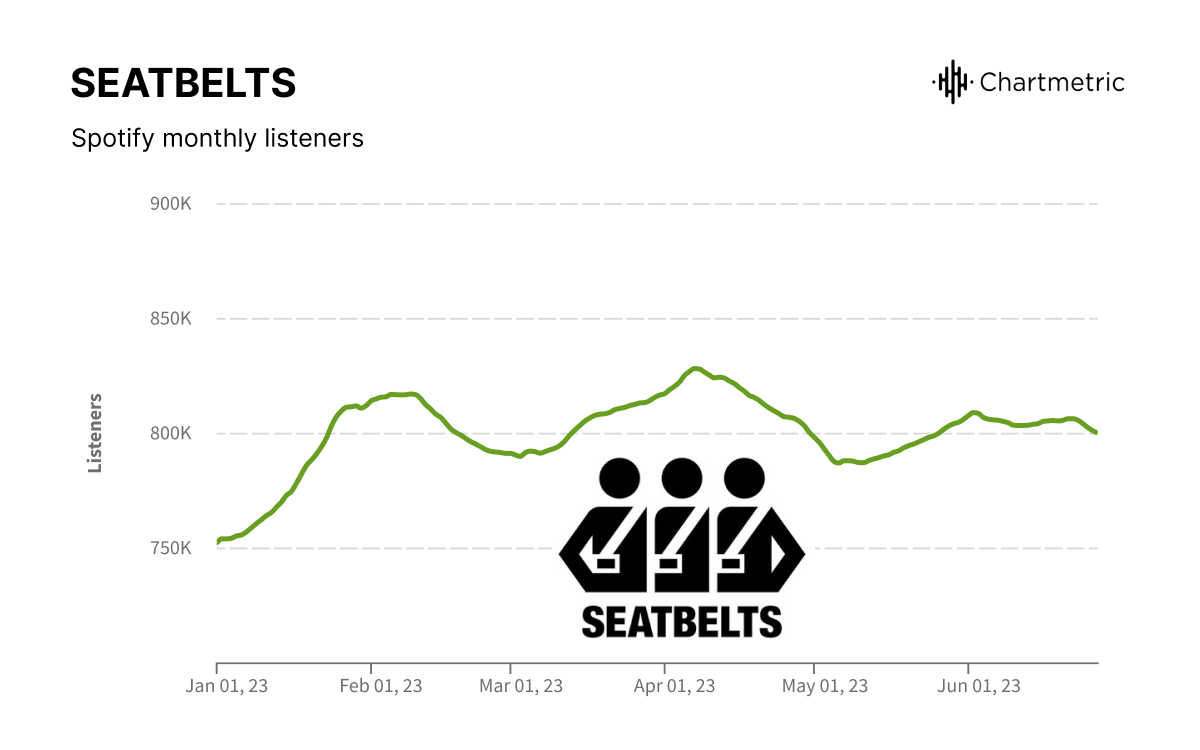
The band’s core Spotify listenership is not in Asia, unlike other hit anisong composers. Instead, their top listener cities are Los Angeles, Santiago, Chicago, Mexico City, and Dallas—perhaps due to Netflix, or the fact that Seatbelts’ music is largely instrumental with some English lyrics.
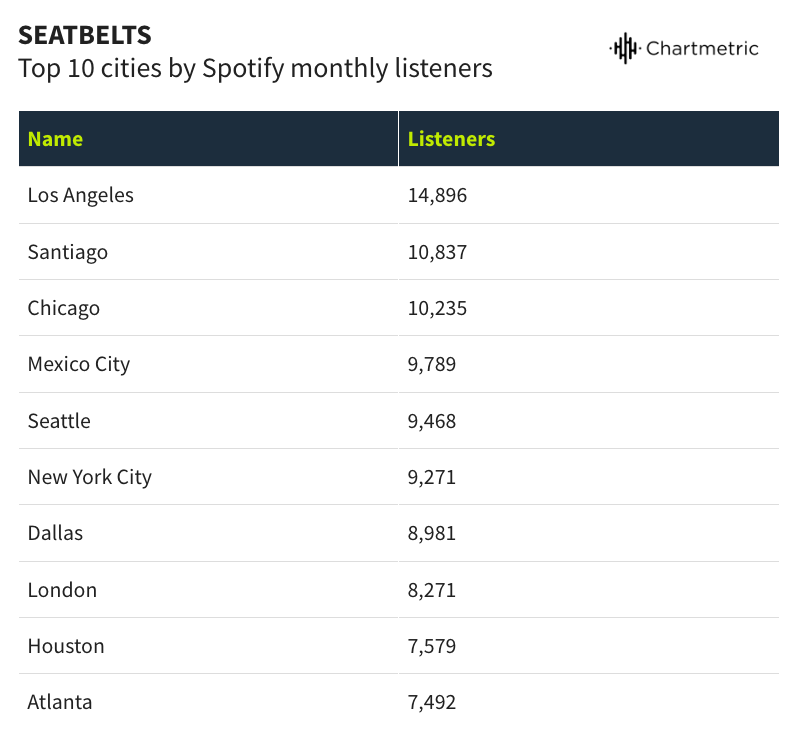
Japanese band Radwimps also became crossover stars with their soundtrack to Makoto Shinkai’s Your Name, which became the 8th highest-grossing animated film worldwide upon its release in 2016. A collection of alternative rock songs that folds in elements of ambient, math-rock, and classical, the album peaked at No. 15 on the Billboard Soundtracks Albums chart. The act now has 6.47M monthly Spotify listeners.
In interviews, the band has discussed the painstaking year-and-a-half-long process of scoring Your Name, which was done in tandem with the animation. “The music changed the story, the lines, and if a new scene was created, we changed the music,” Yojiro Noda, the leader, and songwriter of Radwimps, told Forbes. Sometimes, they had to adjust the composition to precisely match the animation’s timing, and in other parts, the music leads the whole story.
This attention to detail in matching the audio to the visuals might also reveal why fans have continued to revisit the Your Name album: as viewers follow the characters’ journey, they end up strongly associating the music with their shifting feelings and motivations. In today’s media landscape where artists are incentivized to market their music via visuals or short-form media that inspire this kind of emotional connection, it’s not surprising that anisongs are on the rise.
The Growing Global Market of Anisongs
Based in London, the longtime Japanese American pop star Hikaru Utada made the first anisong in their 25-year career by releasing 2021’s “Pink Blood,” used for the series Fumetsu no Anata e. Several K-pop artists have also gotten in on the action; in 2020, the boy band Tomorrow X Together performed the theme “Everlasting Shine” for the series Black Clover, while their HYBE labelmates Enhypen made their Japanese-language debut in 2021 with “Forget Me Not,” which was used in the anime series Re-Main.
As Japanese anisongs are gaining international popularity thanks to platforms like Spotify and TikTok, while non-Japanese artists are attempting to make anisong hits themselves, it seems likely that anisongs will become a powerful tool in an artist’s global crossover strategy. Just take a quick look at the TikToks created using Yoasobi’s “Idol,” and you’ll see a wide web of online otakus, or anime fans, just waiting for the next song that’ll soundtrack their next adventure.
Anime songs, also known as Anisongs, have become a global phenomenon, transcending their original purpose and finding new life outside of the shows and films they were created for. This article beautifully captures the evolution of anisongs and their impact on popular culture. From the viral success of J-pop duo YOASOBI’s ‘Idol’ to the crossover appeal of anisongs in different genres like rock and rap, it’s fascinating to see how these songs resonate with audiences worldwide. The blend of catchy melodies, heartfelt lyrics, and the emotional connection to beloved anime characters creates a powerful experience for listeners. As an anime fan, I appreciate the recognition and celebration of anisongs in this article. It’s a testament to the enduring influence of anime and its music on a global scale.
“Based in London, the longtime Japanese American pop star Hikaru Utada made the first anisong in their 25-year career by releasing 2021’s “Pink Blood,” used for the series Fumetsu no Anata e. ”
Hikaru Utada’s collaboration with Evangelion films predates her involvement with Fumetsu no Anata e…. Beautiful world back in 2007 then One Last Kiss in the early part of 2021…..
I’d like to correct my use of her instead of they, it was my mistake
I have a home-based business and make a respectable $60k per week, which is incredible given that a year ago I was unemployed due to a poor economy. I was given these instructions cs05 as a gift, and it is now my responsibility to spread kindness and make them available to everyone.
.
.
This Page Provides Details———————————>>> http://simplework11.blogspot.com
My testimony on how I became a member of the Illuminati. I want to know people who want to join the big Illuminati as a big member of the Illuminati and want me to be a big member. His name is Lord Felix Morgan. Help me get my life back after the death stage. Released after approximately 5 years and six months. After being betrayed by so many members of the Illuminati. Over the years, I was hopeless and financially on the ground. But one day while browsing the internet I came across the message of great Illuminati member Lord Felix Morgan and said that if you are one of the great Illuminati member you can be famous, rich and successful in the life. I contacted him and explained everything to him and he recommended me the recording used and I paid the fat member to get started and I was introduced to the Illuminati World Order. After that they gave me all the guidelines and let me know that after the initiation new members will be rewarded with the sum of $1,000,000 in cash. With the help of Lord Felix Morgan. I was fully initiated as a full member of the Illuminati. If your opinion is that you have already tried a scammer or you are, it’s up to me to help you participate, then try Lord Morgan. This is your best chance to become what you want in your future life. Contact him by WhatsApp +2348055459757 or by email: Illuminatiofficial565@gmail.com